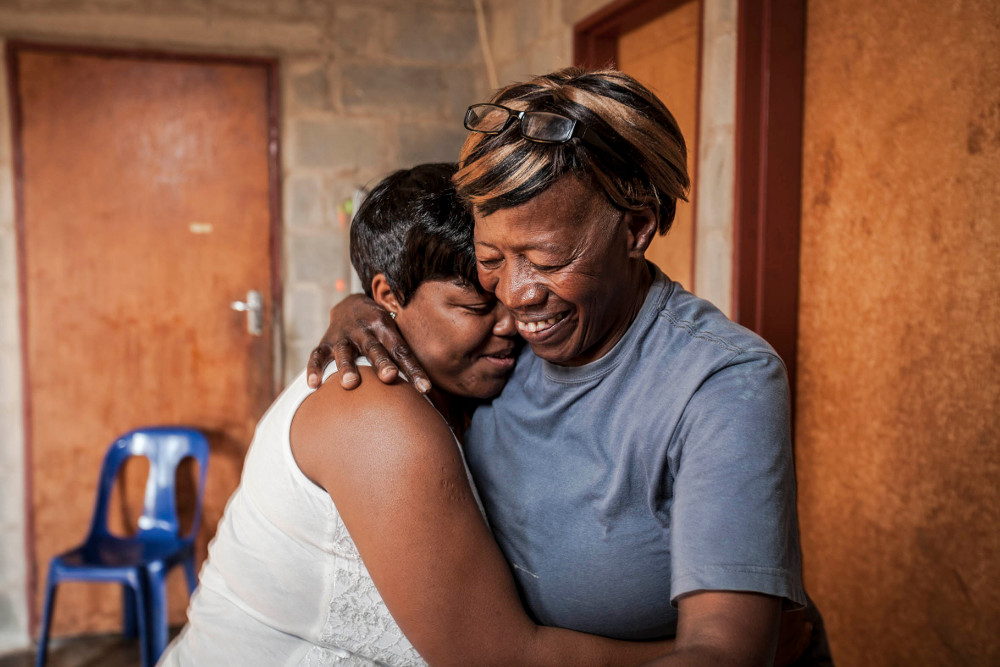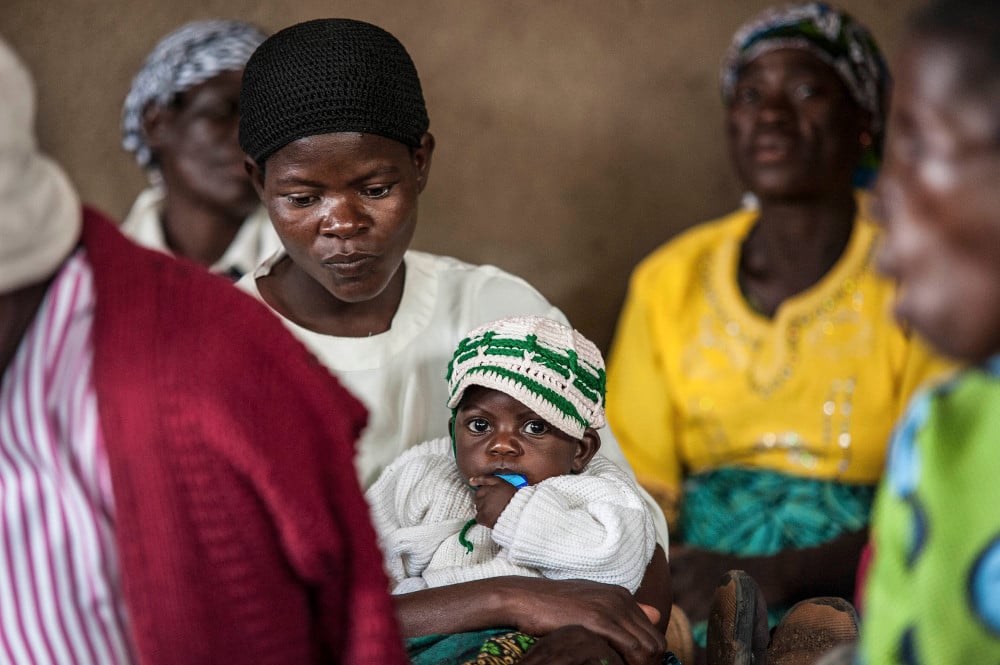Community health workers didn't just provide at-home HIV testing. They went into schools to help teach young people sexual and reproductive health and encourage boys to get medically circumcised. (MSF)
It is mid-morning in the small town of Eshowe in Zululand. A group of women sit in a queue in front of King Dinizulu clinic. Next to the clinic, rows of yellow ANC posters with the smiling face of President Jacob Zuma are lined up along the netball court in front of the community hall.
Minenhle Sibiya watches her two-year-old son, Ndalwenhle, run around the empty part of the court.
“When I heard I had HIV, I was very sad. It wasn’t easy. But I had to accept it,” she explains.
Sibiya was diagnosed with HIV in 2012 and has been on antiretroviral therapy (ART) since then.
“But my baby is fine. When we got the results that he does not have HIV I was so happy I nearly cried.”
She picks up the squirming toddler and carries him into the hall where about a dozen people sit on rows of plastic chairs, talking quietly. Like Sibiya, everybody here is HIV positive and has been on antiretroviral medication for longer than 12 months.
Community support
Every three months the group, an adherence club, meets here where a lay counsellor employed by the aid organisation Doctors Without Borders (MSF) will weigh them, check their blood pressure and give them a supply of antiretroviral drugs that will last until their next meeting.
This is one of more than 80 adherence clubs run by MSF in Eshowe and Mbongolwane.
“Adherence clubs are for patients who are responding to treatment, and are healthy,” explains MSF’s Vivian Cox. “The results have been overwhelmingly good. More patients in adherence clubs stay on treatment and have lower viral loads [the amount of HIV in someone’s blood].”
According to results from a 2007 MSF pilot study of adherence clubs in Khayelitsha in the Western Cape, 97% of the patients in the clubs remained in treatment after a year, compared with 85% of patients who were not part of a club.
“We want to move HIV treatment out of the clinics and free the nurses to focus on the patients who are sick and not responding well to treatment,” says Cox.
International agenda
Drug adherence was an issue at the top of the agenda of this week’s International Aids Conference in Durban.
In 2011 the Western Cape government adopted adherence clubs as an official policy. Now, MSF is working with the KwaZulu-Natal health department to implement similar clubs.
 Community caregiver Nonhlanhla Ngema (left) delivers antiretrovirals to Busisiwe.
Community caregiver Nonhlanhla Ngema (left) delivers antiretrovirals to Busisiwe.
In September, South Africa will implement the World Health Organisation’s (WHO) test-and-treat guidelines. This means everyone with HIV will be eligible for free, lifelong ART. Currently, only HIV-infected people whose immune systems are weak enough receive free HIV treatment.
Studies have shown that providing ART to HIV-positive people at an early stage keeps them healthy and reduces their risk of transmitting the virus to others.
The implementation of the WHO guidelines has huge implications for South Africa — the country will eventually have to double the number of people on ART. Health department data show that the country’s public health sector had provided treatment to 3.4-million people by the end of March this year. South Africa has 6.8-million HIV-infected people, according to UNAids statistics.
Moving out of clinics
The national health department’s deputy director general for HIV, Yogan Pillay, says this huge increase in numbers will only be possible if the department is able to move patients who adhere well to their medicine “out of clinics”, so that doctors and nurses can concentrate on patients on treatment.
“We are ‘decanting’ stable patients. These are patients who are virally suppressed — in other words, those who have undetectable viral loads at 12 months [of treatment],” Pillay says. “Those people don’t need to see a health provider more than once a year.”
Pillay says the department plans to decant 1.3-million ART patients. “By the end of this financial year we would have moved about 800 000 stable patients into the chronic medicine distribution and adherence programme, so that will decrease the burden on the staff, enabling them to put additional patients on treatment.”
Decanting includes getting patients who do not have to be seen by a doctor more than once a year to collect their treatment from a location outside a clinic to which the health department will courier it. Patients will also be encouraged to join support groups such as the MSF’s clubs to ensure that they continue to adhere to their treatment.
Less time spent in queues
“Joining the club has helped me a lot because sometimes I would get to the clinic very early in the morning and wait in the line for a long time, to the point where my child would get hungry and I felt like just going home without collecting my medication,” says Sibiya. “The club is better because you get here in the morning, they do a check-up, give you your pills and you go home.”

Adherence clubs mean no more waiting in queues for ARVs.
Adherence clubs can be tailored to suit the needs of individuals in different setups, says Cox.
Pillay says: “It’s pointless putting people on treatment and then they default. When someone defaults on their antiretroviral treatment, the person runs the risk of becoming resistant to treatment and also transmitting a resistant virus to others. We don’t want in the HIV programme what we have in the TB programme, which is a fairly large drug resistance problem.”
Health department data shows the country’s TB programme has a default rate of about 6% for six months of treatment.
Pillay says South Africa’s HIV adherence rates compare favourably with those of the United Kingdom and the United States for patients who have been on ART for 12 months. “Our data shows that viral suppression at 12 months is about 80%,” he says.
An hour after arriving at Eshowe’s community hall, Sibiya is ready to leave. She received three months of treatment, her blood pressure is normal and her weight stable. She straps her son to her back and hugs each of the club members. “I’m not going to see you until October I’m going to miss you,” she says to a young woman. “You must remember to take your treatment on time. I’m going to WhatsApp you to remind you.”